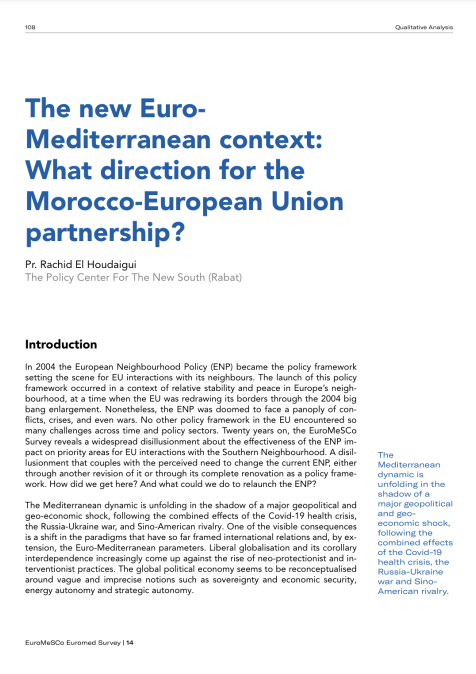Publications /
Policy Brief
This Paper was originally published on euromesco.net
In 2004 the European Neighbourhood Policy (ENP) became the policy framework setting the scene for EU interactions with its neighbours. The launch of this policy framework occurred in a context of relative stability and peace in Europe’s neighbourhood, at a time when the EU was redrawing its borders through the 2004 big bang enlargement. Nonetheless, the ENP was doomed to face a panoply of conflicts, crises, and even wars. No other policy framework in the EU encountered so many challenges across time and policy sectors. Twenty years on, the EuroMeSCo Survey reveals a widespread disillusionment about the effectiveness of the ENP impact on priority areas for EU interactions with the Southern Neighbourhood. A disillusionment that couples with the perceived need to change the current ENP, either through another revision of it or through its complete renovation as a policy framework. How did we get here? And what could we do to relaunch the ENP?
The Mediterranean dynamic is unfolding in the shadow of a major geopolitical and geo-economic shock, following the combined effects of the Covid-19 health crisis, the Russia-Ukraine war, and Sino-American rivalry. One of the visible consequences is a shift in the paradigms that have so far framed international relations and, by extension, the Euro-Mediterranean parameters. Liberal globalisation and its corollary interdependence increasingly come up against the rise of neo-protectionist and interventionist practices. The global political economy seems to be reconceptualised around vague and imprecise notions such as sovereignty and economic security, energy autonomy and strategic autonomy.
This article aims to draw up a portrait of the new dynamics that we believe are relevant to the Euro-Mediterranean debate in general, and to the modernisation of the Morocco-EU partnership in particular: 1) the neo-protectionist trend in EU trade policy; 2) multi-scale threats and risks in the Mediterranean; 3) an ongoing change in the geopolitical status quo; 4) New Moroccan ambitions.









